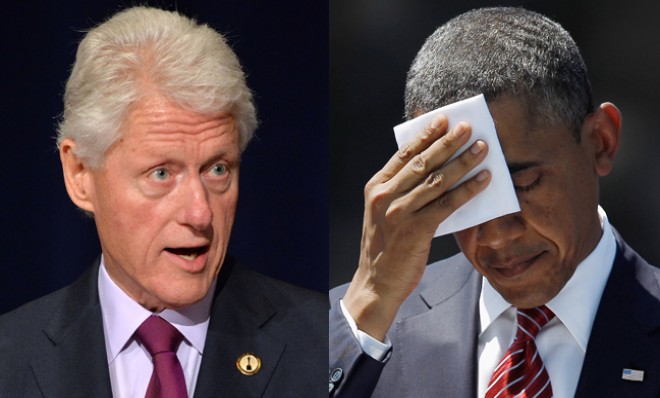Bill Clinton cautions Obama: Beware looking like a 'total wuss' and 'total fool'
The former president says the current president may regret staying on the sidelines if Syria's war worsens


In a rare split over foreign policy, former President Bill Clinton said President Obama risks looking like a "total wuss" if he lets public and political opposition to intervening in Syria dissuade him from taking decisive action to help rebels topple the Assad regime.
"If you refuse to act and you cause a calamity, the one thing you cannot say when all the eggs have been broken is, 'Oh my god, two years ago there was a poll that said 80 percent of you were against it,'" Clinton said in a question-and-answer period first reported by Politico. "You look like a total fool."
Clinton, speaking with Sen. John McCain (R-Ariz.) at a Tuesday event that was closed to the press, contrasted Obama's reluctance to wade more deeply into Syria's widening conflict with the 1999 NATO intervention in Kosovo, which included the bombing of Serbian President Slobodan Milosevic's forces. "You just think how lame you'd be," Clinton said. "Suppose I had let a million people, two million people be refuges out of Kosovo, a couple hundred thousand people die, and they say, 'You could have stopped this by dropping a few bombs. Why didn't you do it?' And I say, 'because the House of Representative voted 75 percent against it?' "You look like a total wuss, and you would be."
The Week
Escape your echo chamber. Get the facts behind the news, plus analysis from multiple perspectives.

Sign up for The Week's Free Newsletters
From our morning news briefing to a weekly Good News Newsletter, get the best of The Week delivered directly to your inbox.
From our morning news briefing to a weekly Good News Newsletter, get the best of The Week delivered directly to your inbox.
The comments provided an unexpected boost to the rising chorus calling for beefing up support for the rebels — McCain is one of the biggest supporters for intervention, and Clinton's wife advocated arming Syrian rebels when she was Obama's secretary of State. Margaret Hartmann at New York notes that former presidents usually avoid publicly criticizing current ones, especially on foreign policy, and suggests that Clinton might not have intended for his remarks to be made public. Now that they are, Hartmann says, Obama will be feeling more pressure than ever to act.
So, note to Obama: When asked about why you dragged you feet on Syria, stick with "concerns about aiding Al Qaeda-affiliated rebel groups," rather than "polls showed Americans weren't feeling it." [New York]
Of course, there are plenty of reasons to resist charging into another war in the Middle East — including the risk that escalating the conflict could increase the risk that it will spread into a regional war. James Joyner at Outside the Beltway points out that it's unfair to suggest that Obama's reluctance to get more deeply involved is due to polls. "The polls opposed intervention in Libya, too," Joyner says, "and that didn't seem to bother him."
I'm inclined to believe that this president is doing his best to serve America's national interests and is tempering whatever ideological preferences he has to intervene in humanitarian disasters — which may be strong, indeed, given how close he's been to Samantha Power going back to at least the 2008 campaign — with a hard-headed cost-benefit analysis. Absent strong evidence to the contrary, that's how I presume any American president decides when to send our forces off to war. [Outside the Beltway]
The U.N. just pushed its estimate of the two-year conflict's death toll to 93,000, up from 80,000 in mid-May, and the State Department is making a fresh push for arming the rebels. Such circumstances might give Obama no choice but to act more forcefully. Aaron David Miller at Foreign Policy notes that there's no diplomatic exit in sight. He also argues that nothing the U.S. has done so far and none of the incremental steps we're considering — arming rebels, imposing a no-fly zone, even launching some airstrikes — will oust President Bashar al-Assad and restore stability.
"After America's baby steps into the Syrian war don't resolve it," Miller says, "Obama will face a choice: He can either stand down and reveal we don't have the will to stand up, or he can escalate." Miller says that judging by the people Obama has chosen to surround himself with lately — the hawkish Susan Rice, his new national security adviser, and Samantha Power, his new U.N. ambassador — it looks like the risk-averse Obama administration is destined to intervene.
A free daily email with the biggest news stories of the day – and the best features from TheWeek.com
The steady drumbeat of death in Syria will increase the pressure on the United States to do something, anything, to stop the violence — even if it's out of good options for doing so. For better or worse, the Obama administration seems headed for military intervention in Syria, with all the risk and uncertainty that entails. [Foreign Policy]
Harold Maass is a contributing editor at The Week. He has been writing for The Week since the 2001 debut of the U.S. print edition and served as editor of TheWeek.com when it launched in 2008. Harold started his career as a newspaper reporter in South Florida and Haiti. He has previously worked for a variety of news outlets, including The Miami Herald, ABC News and Fox News, and for several years wrote a daily roundup of financial news for The Week and Yahoo Finance.
-
 Will Trump’s 10% credit card rate limit actually help consumers?
Will Trump’s 10% credit card rate limit actually help consumers?Today's Big Question Banks say they would pull back on credit
-
 3 smart financial habits to incorporate in 2026
3 smart financial habits to incorporate in 2026the explainer Make your money work for you, instead of the other way around
-
 ‘The surest way to shorten our lives even more is to scare us about sleep’
‘The surest way to shorten our lives even more is to scare us about sleep’Instant Opinion Opinion, comment and editorials of the day
-
 The billionaires’ wealth tax: a catastrophe for California?
The billionaires’ wealth tax: a catastrophe for California?Talking Point Peter Thiel and Larry Page preparing to change state residency
-
 Bari Weiss’ ‘60 Minutes’ scandal is about more than one report
Bari Weiss’ ‘60 Minutes’ scandal is about more than one reportIN THE SPOTLIGHT By blocking an approved segment on a controversial prison holding US deportees in El Salvador, the editor-in-chief of CBS News has become the main story
-
 Has Zohran Mamdani shown the Democrats how to win again?
Has Zohran Mamdani shown the Democrats how to win again?Today’s Big Question New York City mayoral election touted as victory for left-wing populists but moderate centrist wins elsewhere present more complex path for Democratic Party
-
 Millions turn out for anti-Trump ‘No Kings’ rallies
Millions turn out for anti-Trump ‘No Kings’ ralliesSpeed Read An estimated 7 million people participated, 2 million more than at the first ‘No Kings’ protest in June
-
 Ghislaine Maxwell: angling for a Trump pardon
Ghislaine Maxwell: angling for a Trump pardonTalking Point Convicted sex trafficker's testimony could shed new light on president's links to Jeffrey Epstein
-
 The last words and final moments of 40 presidents
The last words and final moments of 40 presidentsThe Explainer Some are eloquent quotes worthy of the holders of the highest office in the nation, and others... aren't
-
 The JFK files: the truth at last?
The JFK files: the truth at last?In The Spotlight More than 64,000 previously classified documents relating the 1963 assassination of John F. Kennedy have been released by the Trump administration
-
 'Seriously, not literally': how should the world take Donald Trump?
'Seriously, not literally': how should the world take Donald Trump?Today's big question White House rhetoric and reality look likely to become increasingly blurred
